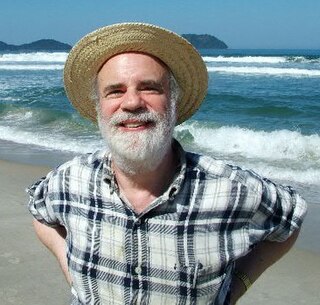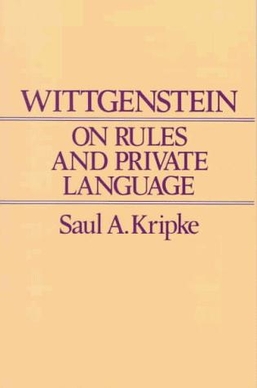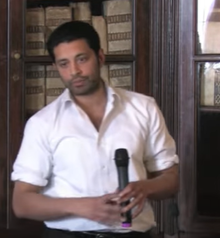In the philosophy of language, a proper name – examples include a name of a specific person or place – is a name which ordinarily is taken to uniquely identify its referent in the world. As such it presents particular challenges for theories of meaning, and it has become a central problem in analytic philosophy. The common-sense view was originally formulated by John Stuart Mill in A System of Logic (1843), where he defines it as "a word that answers the purpose of showing what thing it is that we are talking about but not of telling anything about it". This view was criticized when philosophers applied principles of formal logic to linguistic propositions. Gottlob Frege pointed out that proper names may apply to imaginary or nonexistent entities, without becoming meaningless, and he showed that sometimes more than one proper name may identify the same entity without having the same sense, so that the phrase "Homer believed the morning star was the evening star" could be meaningful and not tautological in spite of the fact that the morning star and the evening star identifies the same referent. This example became known as Frege's puzzle and is a central issue in the theory of proper names.

Philosophical Investigations is a work by the philosopher Ludwig Wittgenstein, published posthumously in 1953.

Saul Aaron Kripke was an American analytic philosopher and logician. He was Distinguished Professor of Philosophy at the Graduate Center of the City University of New York and emeritus professor at Princeton University. Kripke is considered one of the most important philosophers of the latter half of the 20th century. Since the 1960s, he has been a central figure in a number of fields related to mathematical and modal logic, philosophy of language and mathematics, metaphysics, epistemology, and recursion theory.
Analytic philosophy is a broad, contemporary movement or tradition within Western philosophy and especially anglophone philosophy, focused on analysis. Analytic philosophy is characterized by a style of clarity of prose and rigor in arguments, making use of formal logic and mathematics, and, to a lesser degree, the natural sciences. It is further characterized by an interest in language and meaning known as the linguistic turn. It has developed several new branches of philosophy and logic, notably philosophy of language, philosophy of mathematics, philosophy of science, modern predicate logic and mathematical logic.
Gertrude Elizabeth Margaret Anscombe, usually cited as G. E. M. Anscombe or Elizabeth Anscombe, was a British analytic philosopher. She wrote on the philosophy of mind, philosophy of action, philosophical logic, philosophy of language, and ethics. She was a prominent figure of analytical Thomism, a Fellow of Somerville College, Oxford, and a professor of philosophy at the University of Cambridge.

Wittgenstein on Rules and Private Language is a 1982 book by philosopher of language Saul Kripke in which he contends that the central argument of Ludwig Wittgenstein's Philosophical Investigations centers on a skeptical rule-following paradox that undermines the possibility of our ever following rules in our use of language. Kripke writes that this paradox is "the most radical and original skeptical problem that philosophy has seen to date" (p. 60). He argues that Wittgenstein does not reject the argument that leads to the rule-following paradox, but accepts it and offers a "skeptical solution" to alleviate the paradox's destructive effects.
Quentin Robert Duthie Skinner is a British intellectual historian. He is regarded as one of the founders of the Cambridge School of the history of political thought. He has won numerous prizes for his work, including the Wolfson History Prize in 1979 and the Balzan Prize in 2006. Between 1996 and 2008 he was Regius Professor of History at the University of Cambridge. He is the Emeritus Professor of the Humanities and Co-director of The Centre for the Study of the History of Political Thought at Queen Mary University of London.

The Ascension Parish Burial Ground, formerly known as the burial ground for the parish of St Giles and St Peter's, is a cemetery off Huntingdon Road in Cambridge, England. Many notable University of Cambridge academics are buried there, including three Nobel Prize winners.
A referential theory of meaning is a theory of language that claims that the meaning of a word or expression lies in what it points out in the world. Ex, The word tree may have an exterior meaning from the one always intended, that is, tree can be translated into different form of meaning .The object denoted by a word is called its referent. Criticisms of this position are often associated with Ludwig Wittgenstein.

The University of Cambridge was the birthplace of the 'Analytic' School of Philosophy in the early 20th century. The department is located in the Raised Faculty Building on the Sidgwick Site and is part of the Cambridge School of Arts and Humanities. The Faculty achieved the best possible results from The Times 2004 and the QAA Subject Review 2001 (24/24). In the UK as of 2020, it is ranked second by the Guardian, second by the Philosophical Gourmet Report, and fifth by the QS World University Rankings.
A priori and a posteriori are Latin phrases used in philosophy to distinguish types of knowledge, justification, or argument by their reliance on experience. A priori knowledge is independent from any experience. Examples include mathematics, tautologies and deduction from pure reason. A posteriori knowledge depends on empirical evidence. Examples include most fields of science and aspects of personal knowledge.

Naming and Necessity is a 1980 book with the transcript of three lectures, given by the philosopher Saul Kripke, at Princeton University in 1970, in which he dealt with the debates of proper names in the philosophy of language. The transcript was brought out originally in 1972 in Semantics of Natural Language, edited by Donald Davidson and Gilbert Harman. Among analytic philosophers, Naming and Necessity is widely considered one of the most important philosophical works of the twentieth century.
Carl Ginet is an American philosopher and Professor Emeritus at Cornell University. His work is primarily in action theory, moral responsibility, free will, and epistemology.

Gonville and Caius College, often referred to simply as Caius, is a constituent college of the University of Cambridge in Cambridge, England. Founded in 1348 by Edmund Gonville, it is the fourth-oldest of the University of Cambridge's 31 colleges and one of the wealthiest. In 1557, it was refounded by alumnus John Caius. The college has been attended by many students who have gone on to significant accomplishment, including fifteen Nobel Prize winners, the second highest of any Oxbridge college.

The Cambridge University Moral Sciences Club, founded in October 1878, is a philosophy discussion group that meets weekly at the University of Cambridge during term time. Speakers are invited to present a paper with a strict upper time limit of 45 minutes, after which there is discussion for an hour. Several Colleges have hosted the Club: Trinity College, King's College, Clare College, Darwin College, St John's College, and from 2014 Newnham College.
Rev. Hamnet Holditch, also spelled Hamnett Holditch, was an English mathematician who was President of Gonville and Caius College, Cambridge. In 1858, he introduced the result in geometry now known as Holditch's theorem.
Professor John Dixon Mollon DSc FRS. is a British scientist. He is a leading researcher in visual neuroscience. His work has been cited over 15,000 times.
John Forbes Cameron was a Scottish mathematician, academic and academic administrator. He was Master of Gonville and Caius College, Cambridge from 1928 to 1948 and was Vice-Chancellor of the University of Cambridge from 1933 to 1935.
Kaave Lajevardi is an Iranian philosopher. He is known for translating classic philosophy books into Persian. Lajevardi was a faculty member of Institute for Research in Fundamental Sciences (2008-2012). He has published some papers on academic dishonesty in Iranian universities.

Henry Crowe was an English parish priest and early animal rights writer.









